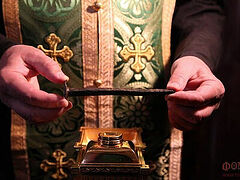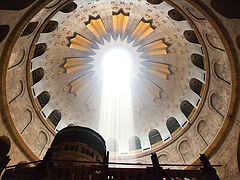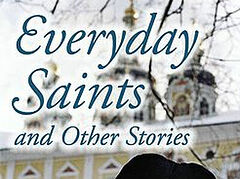I have been Orthodox for ten years now (I was raised Anglican), and during that time I have endeavoured to read Orthodox literature. In the beginning, that meant the lives of contemporary elders (an easy and often inspiring way into leading an Orthodox life) and some Church Fathers. In particular, I was helped by Johanna Manley’s The Bible and the Holy Fathers for Orthodox, a 1000-page volume of Bible passages and commentaries by Church Fathers (frequently St John Chrysostom). It constitutes a treasury of Orthodox learning.
This book is published by St Vladimir’s Seminary Press, who seem to be the main publishers of Orthodox literature, based in the United States, which makes postage expensive for those of us who live outside the US, though their titles are also available on Kindle. Lives of contemporary elders are often published by the monasteries where they lived. I tend to avoid academic publishers such as Routledge, whose series The Early Church Fathers looks nice, but is, I think, insanely expensive (in the region of 30 pounds, even for Kindle titles, which cost nothing to print or send). I tried a couple of their titles and found them excessively dry. St Vladimir’s has done better with their series Popular Patristics, though again their Kindle editions are quite expensive (in the region of 10 pounds). The titles from this series are interesting, but they are essentially new translations, with an introduction, of material that can be found freely on the Internet. Also, while Church Fathers are essential to an understanding of the faith, it is sometimes nice to read contemporary writers who are not so concerned with fourth-century heresies or church politics and have simple advice to offer to the lay person on the spiritual life.
People at the beginning of their road as Orthodox faithful often ask what Bible they should use, what prayer book. I know it is common practice among Orthodox to use the New King James Version. Personally, I continue to use the New Revised Standard Version, which was the version used when I was in the Church of England, though I am also an admirer of The Orthodox Study Bible with its notes on Scripture following the Orthodox tradition. For the Psalter, I highly recommend the pocket edition of A Psalter for Prayer adapted by David Mitchell James from the Myles Coverdale translation of 1535 (earlier than the King James Version). Crucially for me, it contains not only the psalms in a beautiful translation, but deep and moving prayers at the end of each kathisma (the Psalter is divided into twenty kathismata or “sittings”, each of which is divided into three staseis or “standings”, making a total of sixty sections; I read one stasis in the evening). These prayers are missing from other editions.
As for prayer books, I’m rather fond of The Orthodox Prayer Book, first printed by “Svit” in 1957 in a bilingual English-Church Slavonic edition, with the text of the liturgy and akathists (long devotional prayers) to Christ and the Theotokos. Another Slavonic prayer book is the Jordanville Prayer Book, which has similar content, but also includes supplicatory canons to Christ, the Theotokos, and the Guardian Angel. Then there is Holy Transfiguration Monastery’s A Prayer Book for Orthodox Christians. This monastery does beautiful translations and editions, including their standout editions of The Ascetical Homilies of Saint Isaac the Syrian and The Ladder of Divine Ascent. Their prayer book is again similar and includes supplicatory canons. For me, which prayer book you choose depends a little whether you lean more towards the Greek or the Russian traditions. I live in Bulgaria, which is Slavonic, but I studied Classics at university, so I’m a bit between the two. A much simpler prayer book is The Ancient Faith Prayer Book, with more varied prayers, but no text of the liturgy or akathists/canons. There is also Orthodox Christian Prayers from St Tikhon’s Monastery, Fr Alexander Schmemann’s A Manual of Eastern Orthodox Prayers, and Fr Michael Monos’ Orthodox Christian Prayer Book, but I don’t have these. The one I have used most is HTM’s A Prayer Book for Orthodox Christians, and I still recite the introductory prayers, the Lord’s Prayer and Creed, according to their translation.
I wanted to give those Orthodox books that most moved me, that I most enjoyed, not because they’re the ones I felt obliged to read, but because they spoke to me as an ordinary Christian pilgrim. They may not be great names (though some of them are), but if I had to leave in a hurry, these are the books I would take with me. I do not include here the Bible, which is obvious, or the four (soon to be five) volumes of The Philokalia, a work I found far too daunting in the early days and am only now beginning to read from beginning to end (two pages a night). The Philokalia in its English manifestation—a valuable service provided by translators G.E.H. Palmer, Philip Sherrard, and Kallistos Ware—contains some truly wonderful texts, and if I’m honest and could only take one book with me, this is the one I would take (together with A Psalter for Prayer). In extremis. Oh, and maybe Donald Sheehan.
Church Fathers
Orthodoxy sets great store by Church Fathers from St Clement of Rome in the first century to St Gregory Palamas in the fourteenth. It sets great store by tradition. It is almost as if there is nothing new to be said. There is no doubting the enormous sacrifice of these churchmen—St John Chrysostom (responsible for the text of the liturgy) was exiled for his beliefs, St Maximus the Confessor had his tongue and right hand cut off. They defended the Church against numerous (and dangerous) heresies, handing down to us the prayers we use in our services and right belief (take, for example, the Creed, which was written down at two church councils in the fourth century and which we still recite today).
And yet, while respecting tradition, we must be open to the action of the Holy Spirit, which continues to inspire people today. So I don’t think we have to limit ourselves to Church Fathers. I try to find a balance between the two—Church Fathers and contemporary writing. Of the Church Fathers, I have found some disappointing, their style too formal. Perhaps my own spiritual growth has not been on a level with their writings. I was not ready and have simply skimmed the surface without managing to go inside—like walking around a building for which one does not have the key. One can admire it from the outside, but the fact is, despite the grey stone and impressive structure, one is missing the riches inside.
There are some Church Fathers, however, who have spoken to me very directly. People like Ignatius of Antioch in his letters en route to Rome, Cyril of Jerusalem and his catechetical lectures, Gregory the Great (who sent Augustine on a mission to England). And at the top of the list would be the pithy wisdom of the Desert Fathers, the fourth-century hermits of Egypt, where monasticism began.
These would be my favourite books by Church Fathers, the ones that involved me personally:
1. In the Heart of the Desert: The Spirituality of the Desert Fathers and Mothers
This is an astonishingly beautiful study by contemporary theologian John Chryssavgis, who acts as an advisor to the Ecumenical Patriarch. Rarely have I read such a beautiful book, Orthodox or otherwise.
There are collections of the sayings of the Desert Fathers: The Desert Fathers: Sayings of the Early Christian Monks, The Sayings of the Desert Fathers: The Alphabetical Collection—both by Benedicta Ward—and Thomas Merton’s The Wisdom of the Desert. I think people tend to incline towards the one they read first.
2. Fifty Spiritual Homilies of Saint Macarius the Egyptian
Also a Desert Father. I read the edition by Aeterna Press, a useful publisher that makes old translations of Church Fathers available at a low price.
3. Dorotheos of Gaza, Discourses & Sayings
This book takes us along the path followed by early monasticism – from Egypt in the fourth century to Palestine and Syria in the sixth, but it is essentially again desert spirituality.
4. John Climacus, The Ladder of Divine Ascent
This book describes the spiritual life in thirty steps and contains one of the best quotes I have ever read (I used it in my book on language and the environment, Stones Of Ithaca): “Love is the progress of eternity.” Wow!
5. The Ascetical Homilies of Saint Isaac the Syrian
There are many people who would say that Orthodox theology is contained in the writings of this seventh-century Syrian ascetic (and briefly bishop).
6. Gregory Palamas, The Homilies
I am now jumping forward seven centuries, from Syria to Greece. These homilies are exquisitely translated by Christopher Veniamin.
7. Dumitru Staniloae, Orthodox Spirituality: A Practical Guide for the Faithful and a Definitive Manual for the Scholar
This is a contemporary work by Romanian theologian Dumitru Staniloae, but it is basically a summary of Orthodox Church teaching for the student of Orthodox theology. Very enriching. I read a couple of pages each morning, which I think is the way to approach many of these books. They are not novels to be read at night. You need to be fresh for them, your mind clear.
Contemporary Elders
Church Fathers, not so much the hermits, can appear a little imposing, and it can help to approach Orthodoxy through the lives of people not so distant from us. Especially in the beginning, I found reading their lives—and going to visit the places where they lived and to venerate their relics when the opportunity presented itself—very encouraging. Some were monks on Athos, the peninsula in northern Greece devoted to Orthodox monasticism; others are monks in the world. There is even a royal princess, born in Germany and now resting in Jerusalem! Their lives are an example, but spare a thought for their biographers, thanks to whom we are able to read about them. Here are the ones I found most moving, in order of when they lived:
If I ever get to Russia, one of the places I would like to go, apart from the Holy Trinity Lavra of St Sergius, is Optina Monastery, famous for its Optina Elders. This lovingly compiled biography concerns one of these elders, Moses, who lived in the nineteenth century. Very touching.
9. Grand Duchess Elizabeth of Russia: New Martyr of the Communist Yoke
A tale of riches to rags, a German princess who married into the Russian royal family, became abbess of a convent in Moscow, and later died at the hands of revolutionaries. Lovingly prepared by Lubov Millar.
10. My Elder Joseph the Hesychast
Strictness belies the gentleness within. The asceticism of this monk is amazing! This biography has the advantage of having been compiled from the words of Elder Ephraim of Arizona, an important Athonite monk who went on to found numerous monasteries in the United States.
11. Saint Paisios of Mount Athos
My first great elder. Like many Greeks, I fell in love with this elder (now a saint), who before dying asked to be stricken with cancer so he could understand the sufferings undergone by others and constantly put his life on the line for others. He is buried just outside Thessaloniki, at the Monastery of St John the Theologian in Souroti (this monastery has produced numerous books with his spiritual counsels). It is possible to visit his hermitage on Athos near Koutloumousiou Monastery.
12. Archimandrite George (Kapsanis), Theosis: The True Purpose of Human Life
This is not a life, but a work written by a former abbot of Grigoriou Monastery on Athos. I was fortunate enough to receive a blessing from him on my first visit to Athos and to have coffee on a balcony hanging over the sea with one of his English translators, Fr Damian. This short little book is a pearl about that most important thing, theosis (or deification).
13. Archimandrite Aimilianos of Simonopetra, The Church at Prayer: The Mystical Liturgy of the Heart
Another work, not a life. I still remember my visit in 2016 to Ormylia Convent in northern Greece, where Archimandrite Aimilianos was cared for after he retired as abbot of Simonopetra Monastery until his death in 2019. Not only did I receive some very beneficial advice from a visiting monk, two nuns gave me coffee (I was driving rather long distances at the time) and then did that most extraordinary thing—they listened to me. They actually listened to me, and the fact they listened with complete concentration, as if I was the only person that mattered at that moment, I found incredibly healing. Even now, I remember this gesture of theirs. Archimandrite Aimilianos’ writings are similarly healing, similarly pastoral.
14. Archimandrite Zacharias (Zacharou), The Hidden Man of the Heart
Archimandrite Zacharias is a contemporary elder at the Patriarchal Stavropegic Monastery of St John the Baptist in Essex, England. His talks, which centre on that shortest of journeys from the head to the heart, have been transcribed and published by his monastery.
Everyday Saints
15. Metropolitan Tikhon (Shevkunov), Everyday Saints and Other Stories
This book was a hit when it came out in 2011 and has sold millions of copies in the original Russian and in translation. It is a lovely collection of anecdotes about life in the Church. My own favourite was the doorkeeper of a monastery in western Russia who got so sick of busloads of tourists that he decided one day to refuse entrance to anyone who couldn’t recite the Creed. The abbot was informed and angrily insisted he open the gate, which he agreed to do. A little act of resistance.
These are my fifteen favourite Orthodox books. You will see that they have to do very much with the ordinary, routine act of living, not high theology. But the list would not be complete without mention of an American contemporary Orthodox writer, Donald Sheehan, and his selected essays, The Grace of Incorruption. I am currently reading this book and have the impression Donald Sheehan is already one of my favourite writers. He gives immense importance to the composition and translation of the psalms, the journey towards blessedness (something Rilke would have understood) contained in the progression of the psalms, and more amazingly brought about by their reading. This would be my sixteenth book, except I haven’t finished it yet. As with the act of translation, the life of a pilgrim is never quite finished.





